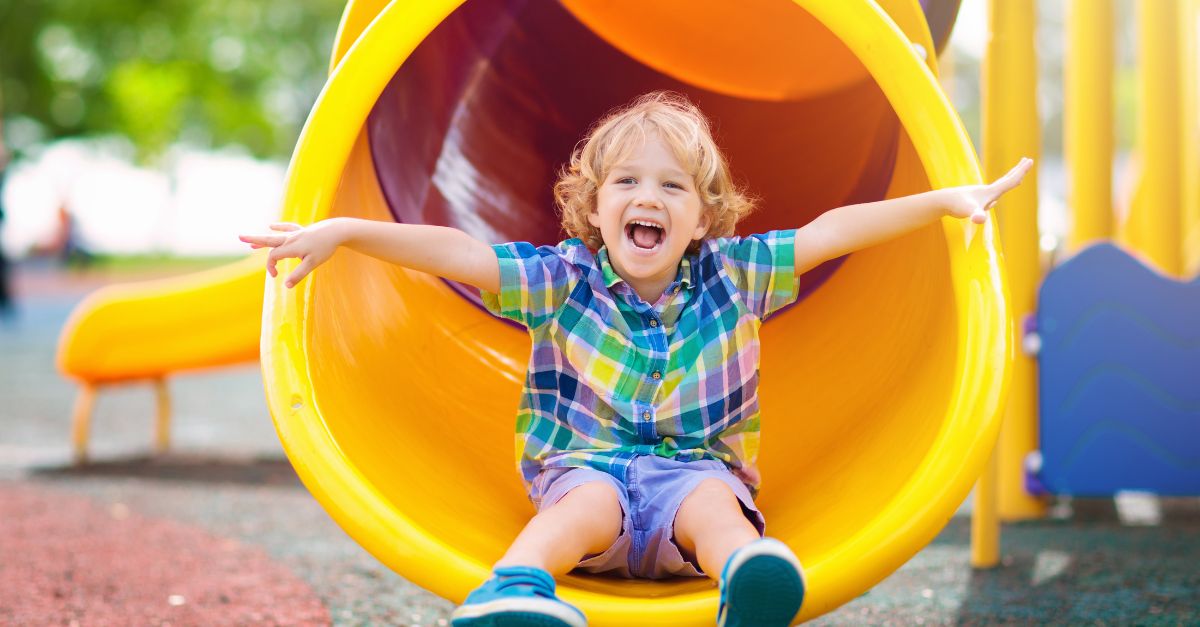Why outdoor play is important to childhood development
Children need to remain active throughout the day. Promoting outdoor play allows them to get fresh air and explore their environment. Hands-on learning, the natural environment and loose parts in the outdoors stimulate children’s senses through what they hear, touch, see and feel.
Outdoor play is an important part of childhood. It’s exciting to see children in their natural environment – exploring their surroundings, being curious about what’s around them, and finding joy in seeing new things.
At a young age, I always remember running around the park, digging and dumping the sand in the sandbox, and climbing up and going down the slide.
The Importance of outdoor play and physical activity in a natural environment
It is sad to see children spending less time having outdoor playtime. A recent study in the UK found that children today spend half of the time outside compared to their parents. As an educator, I know how vital outdoor play is to a child’s overall development and learning.
Studies have shown that children can learn a lot from playing outdoors – from improved spatial recognition to simply understanding environmental tendencies. Simple activities such as seeing leaves change, running and jumping in rain puddles, or watching the flowers sprout during the spring, can make such a large difference.

The benefits of playing outdoors
Outdoor play improves physical development
There are many benefits of outdoor play. Physical skills are important for growth, physical coordination, gross motor skills, movement of the body, the immune system, and mental health. When children play outdoors they increase their ability to balance, jump, climb, throw, run and skip.
Make more friends!
Outdoor play provides the opportunity and can encourage children to gain social skills by interacting, collaborating, and negotiating with other children in outdoor environments.
Increased imagination
Being outdoors and doing physical play gives children the opportunity to pretend to be anything they want when they play games. For example, a bear in the wild or a chef in the kitchen.
Gain knowledge and appreciation for the natural world
Children learn about the natural elements and their surroundings when they are outside. For example, they learn about the weather, the change in seasons, and different animals that are found outside.

Easy and fun outdoor activities
Flower ice cube sensory play
You will need:
- 2 ice cube trays, water, a bunch of flowers from the garden, and a freezer
Instructions:
- Place one single head of a flower in each cube.
- Pour water over the flowers and place the ice cube trays into the freezer and leave overnight.
- Take the trays out of the freezer and push the flower ice cubes out into a bowl.
Chalk roads
You will need:
- 1 bucket of colored chalk and an empty area in the playground on the concrete.
Instructions:
- Draw big and small circles and color them in and draw vertical and straight lines.
- Let the children jump from circle to circle and walk along the vertical and straight lines without falling over.
- Make a game out of it and let the children balance, run, jump and skip. Allow children to explore and have fun.
Make sure you’re not missing learning milestones by leveling up your observation techniques!
Embed This Infographic On Your Site (copy code below)
<div><a href=”https://lillio.kinsta.cloud/blog/outdoor-play-and-childhood-development/” title=”Why Outdoor Play is Important to Childhood Development” alt=”Why Outdoor Play is Important to Childhood Development” border=”0″/><img src=”https://lillio.kinsta.cloud/blog/wp-content/uploads/2019/01/why-outdoor-play-is-important-for-child-development-1370×4545.jpg” /></a><br/><br/><div> Courtesy of: <a href=”https://www.himama.com/”>Himama</a></div></div>
Alexandra Louis
October 1st, 2020
11 mins
Related Articles

Preparing your Childcare Summer Camp Program
April 16th, 2025 | Maddie Hutchison




